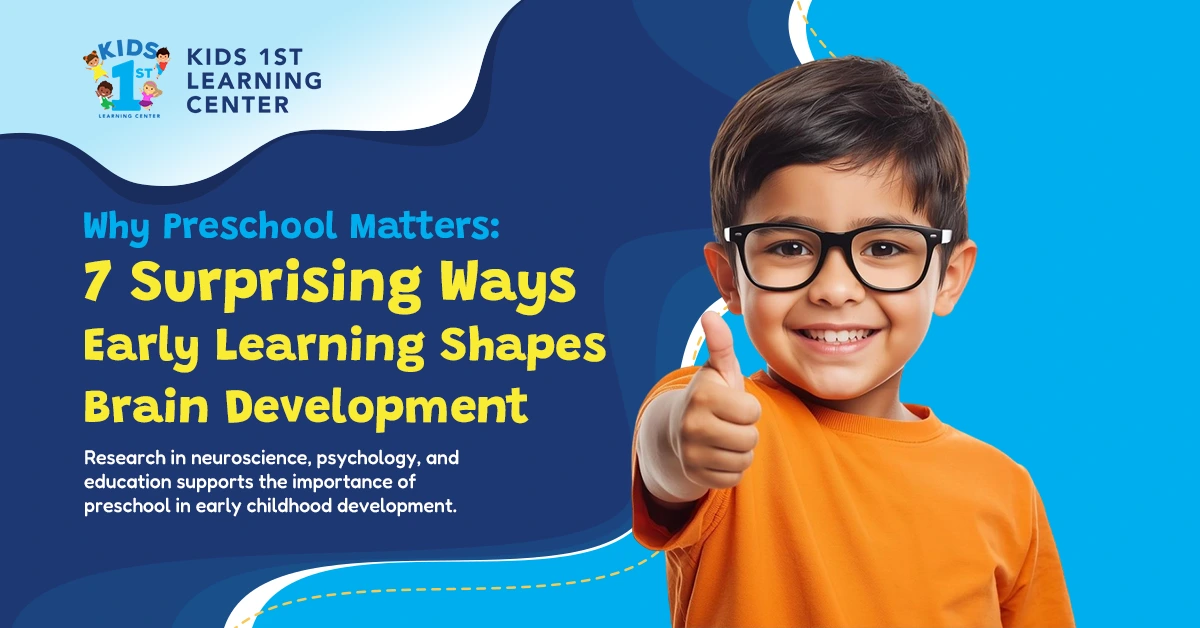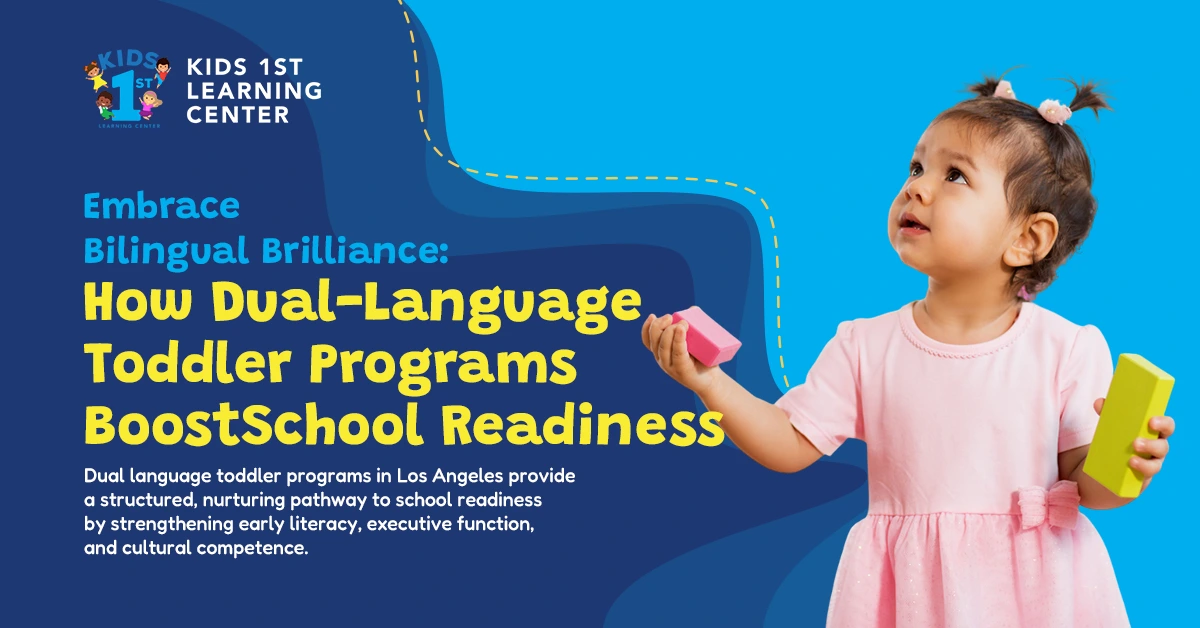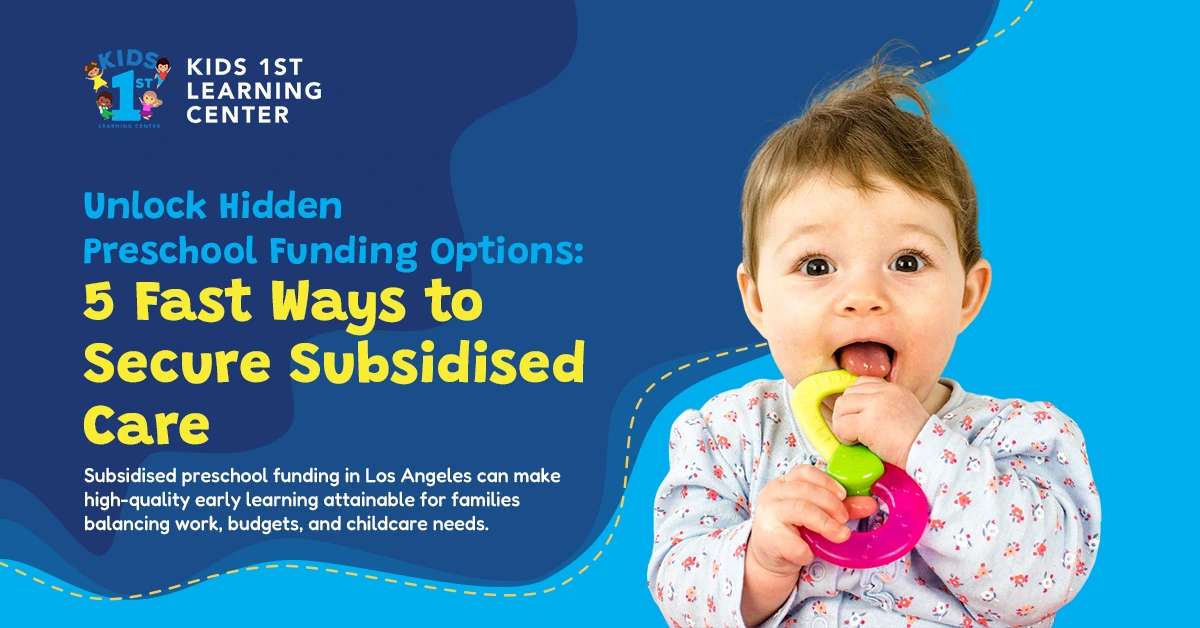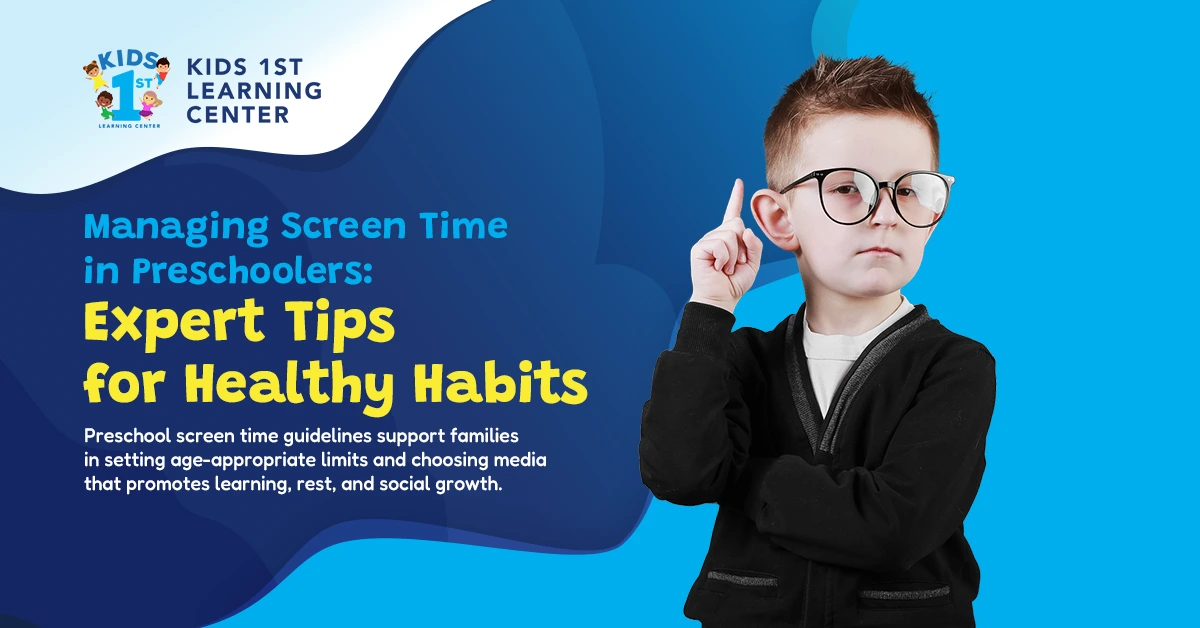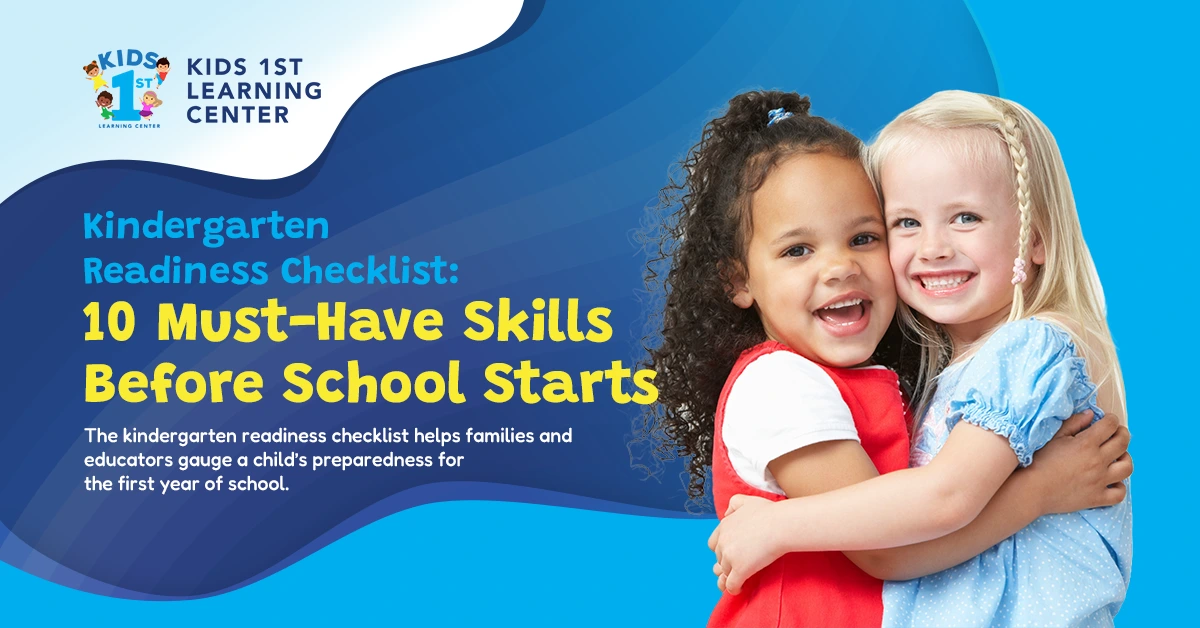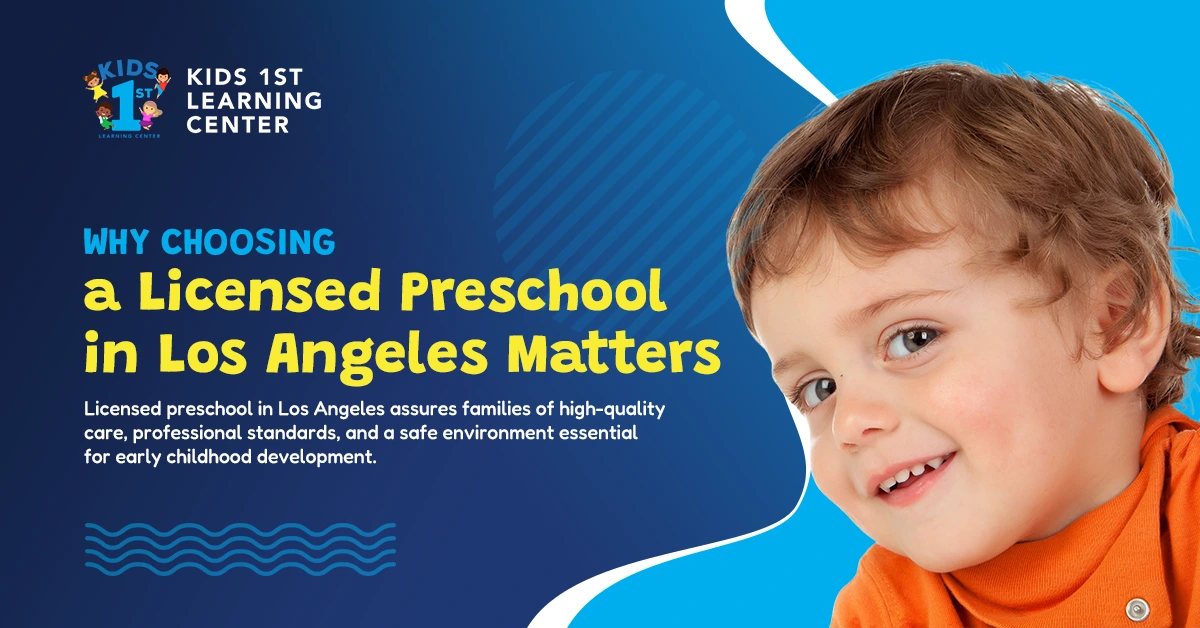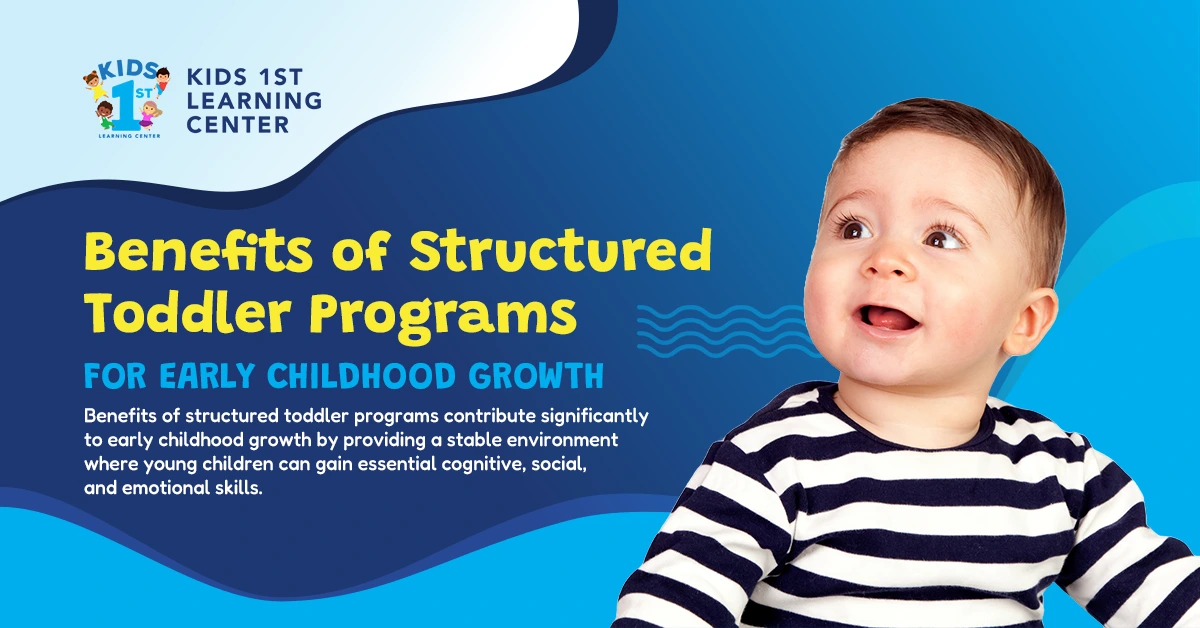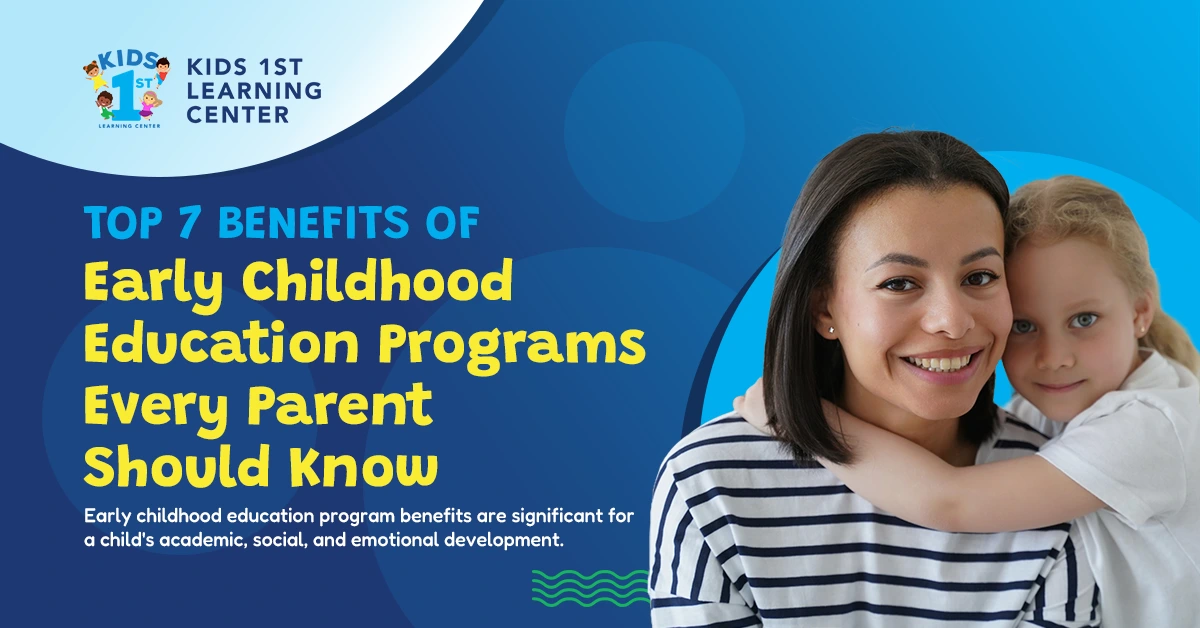
Early childhood education program benefits are significant for a child’s academic, social, and emotional development. These programs offer structured learning environments supporting cognitive growth, language skills, and social interaction during the formative years. Through age-appropriate activities and guidance from qualified educators, children gain foundational tools that prepare them for long-term educational success.
Early childhood programs also help build routines, promote independence, and encourage healthy behaviors, all within a safe and nurturing setting. These programs support families, fostering strong partnerships between educators and parents. Understanding the value of early education allows families to make choices that positively impact their child’s future.
1. Why Early Childhood Education Is Critical for Development
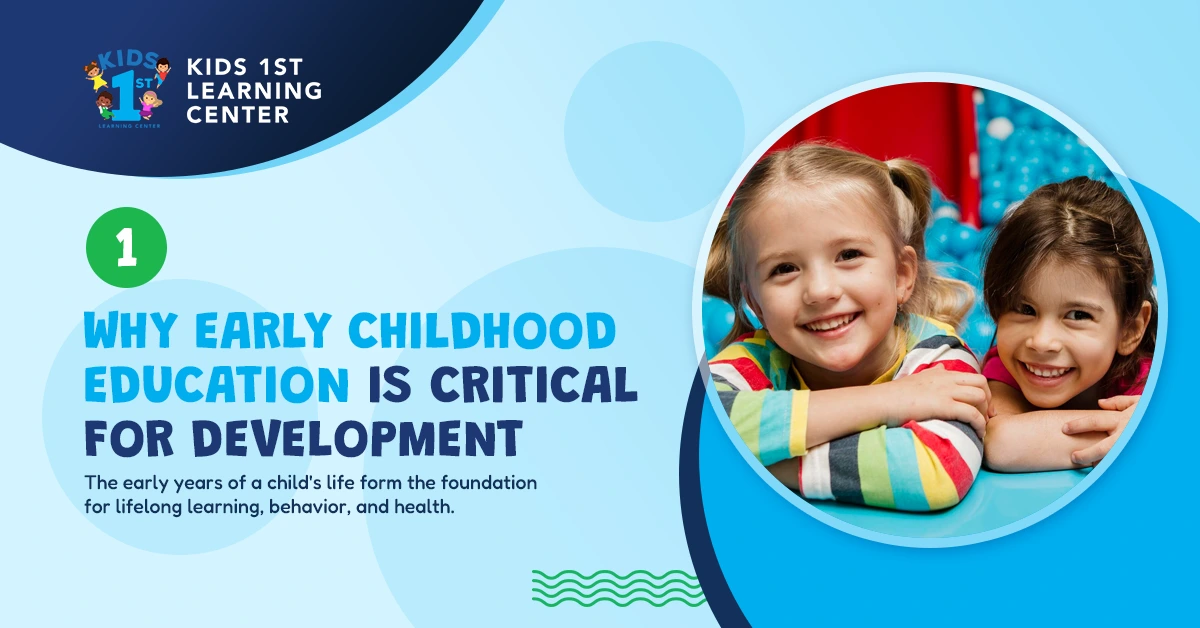
The early years of a child’s life form the foundation for lifelong learning, behavior, and health. Understanding why early childhood education is critical for development helps families make informed choices that support their child’s future. High-quality early education programs provide structured opportunities for growth during rapid brain development.
Cognitive and Emotional Foundations
Children’s brains develop most rapidly before the age of five. During this time, early learning experiences have a lasting impact on memory, attention, and emotional regulation.
Key benefits include:
- Stimulated brain development: Activities that promote problem-solving, creativity, and exploration strengthen cognitive pathways
- Improved emotional skills: Children learn to identify emotions, manage frustration, and build resilience
- Greater adaptability: Consistent routines and new experiences foster flexibility and confidence
These programs develop an environment where children can learn through guided play and meaningful interaction.
Building Social Awareness and Skills
Early education programs offer structured peer interaction, helping children develop essential social abilities.
Social benefits include:
- Cooperation and sharing: Children learn how to work in groups and respect others
- Conflict resolution: Educators guide children in managing disagreements in a positive way
- Cultural understanding: Exposure to diverse backgrounds fosters inclusion and empathy
By addressing multiple areas of development, early childhood education supports well-rounded growth and prepares children for future success.
2. Long-Term Benefits of Preschool Programs
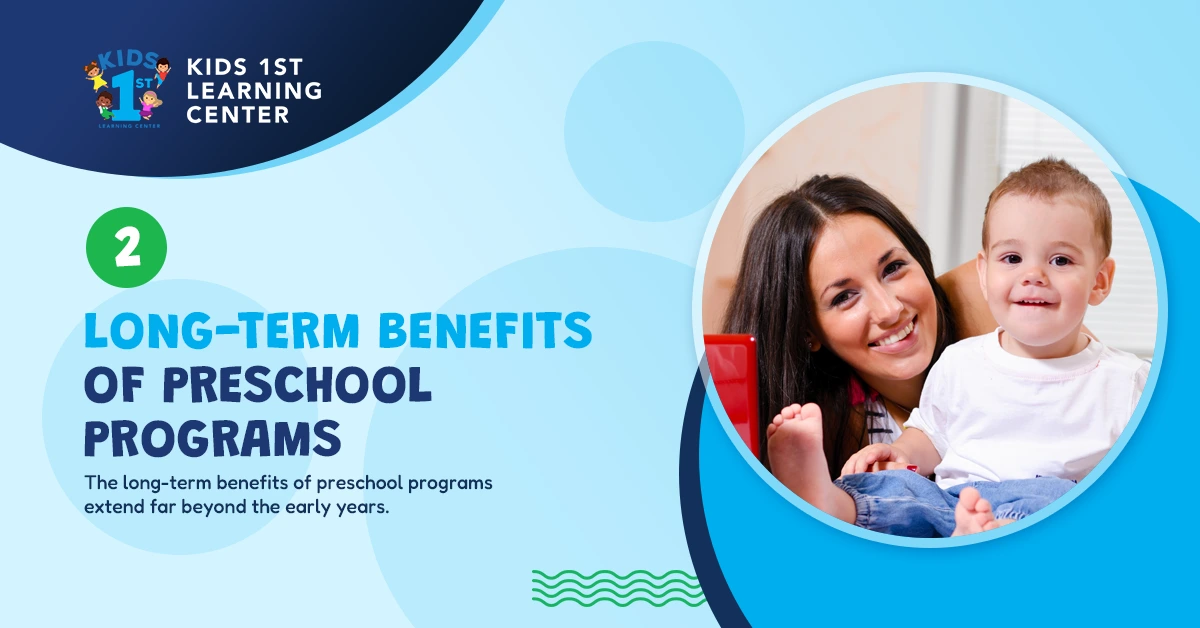
The long-term benefits of preschool programs extend far beyond the early years. Participation in high-quality preschool lays the groundwork for academic achievement, emotional resilience, and lifelong success. Research consistently shows preschool children are better prepared to navigate social environments effectively and meet future educational milestones.
Academic and Cognitive Advantages
Preschool programs introduce structured learning experiences that promote early literacy, numeracy, and problem-solving.
Lasting academic benefits include:
- Improved school readiness: Children enter kindergarten with foundational skills in reading and math
- Higher graduation rates: Early exposure to learning increases the likelihood of completing high school
- Stronger academic performance: Early learners often show greater engagement and motivation in future schooling
These outcomes contribute to long-term educational attainment and confidence in academic settings.
Social, Economic, and Life Outcomes
The impact of preschool goes beyond academics, influencing personal development and future opportunities.
Key long-term benefits include:
- Better social adjustment: Early exposure to group settings fosters cooperation and communication
- Higher earning potential: Studies link early education with improved career outcomes and income levels
- Lower involvement in correctional systems: Early positive experiences contribute to long-term behavioral stability
Preschool programs are critical investments in a child’s future, promoting growth into adulthood.
3. How Early Learning Programs Prepare Kids for Kindergarten
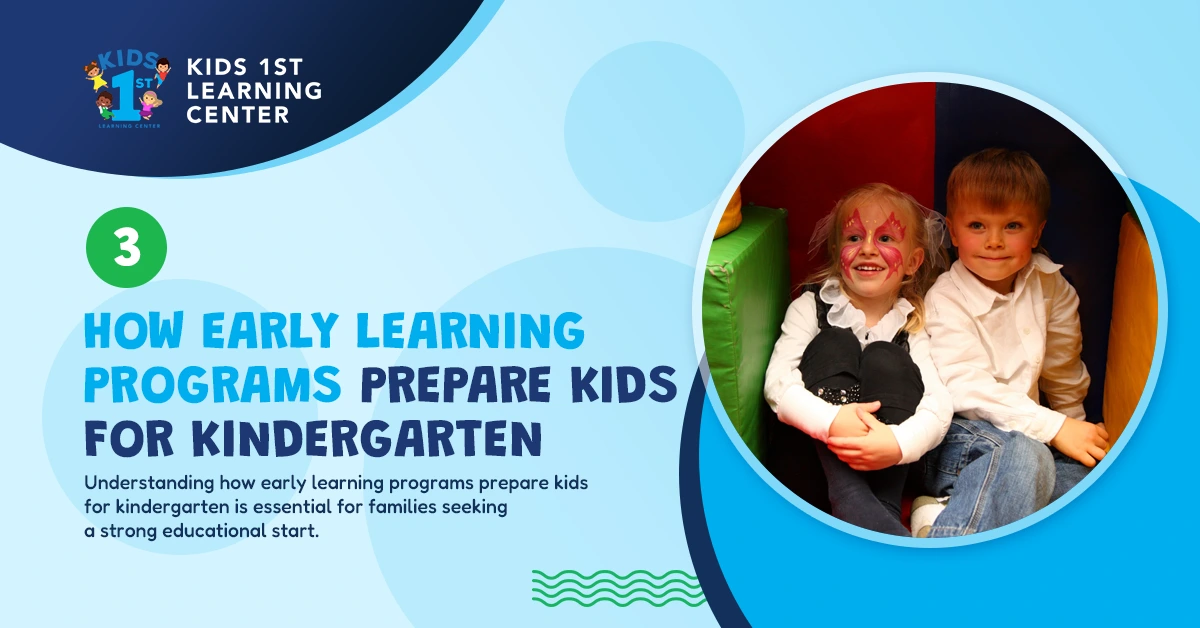
Understanding how early learning programs prepare kids for kindergarten is essential for families seeking a strong educational start. These programs introduce children to structured routines, group interaction, and foundational skills that align with kindergarten expectations. As a result, children enter school confident, capable, and ready to learn.
Academic and Cognitive Readiness
Early learning programs support the development of basic academic skills through age-appropriate instruction and guided play.
Preparation includes:
- Early literacy exposure: Activities involving storytelling, letter recognition, and phonics build pre-reading skills
- Foundational math concepts: Children learn to count, recognize patterns, and understand basic shapes and numbers
- Problem-solving practice: Hands-on activities encourage logical thinking and independent decision-making
These skills form the academic base needed for success in kindergarten and beyond.
Social and Behavioral Preparation
Kindergarten readiness also involves adapting to group environments, following routines, and managing emotions appropriately.
Social preparation involves:
- Following directions: Children practice listening and responding to teacher guidance
- Taking turns and sharing: Regular peer interaction fosters cooperation
- Transition management: Consistent schedules help children adjust to new activities and settings.
Early learning programs support academic and behavioral development, equipping children with the tools needed to thrive from the first day of kindergarten.
4. Social and Emotional Growth in a Structured Setting
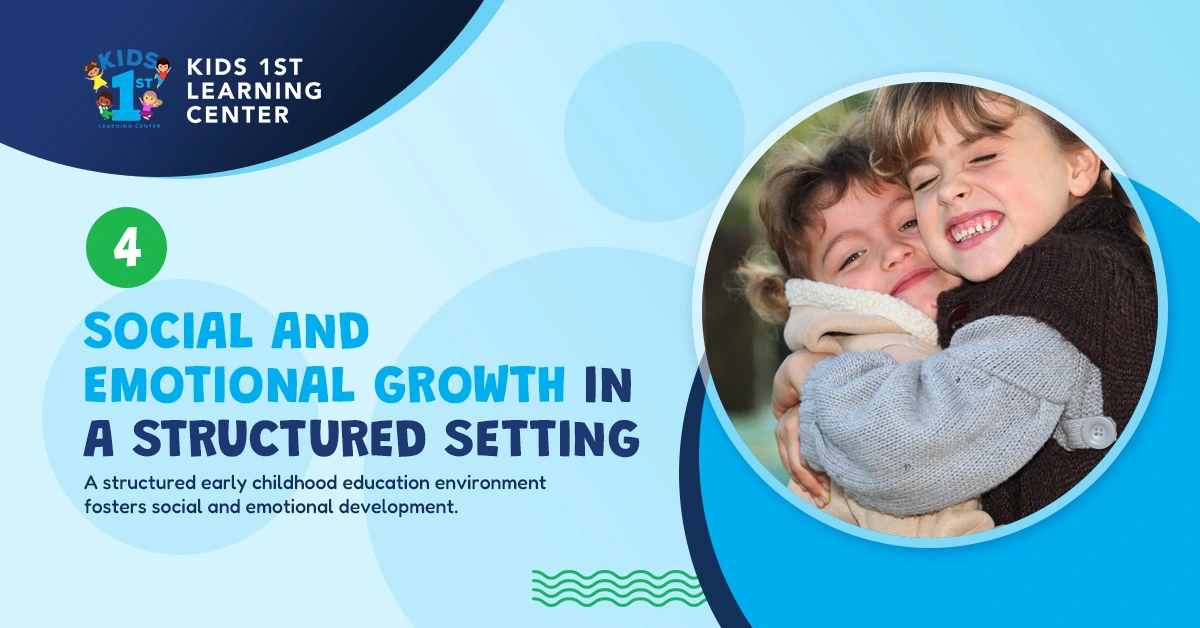
A structured early childhood education environment fosters social and emotional development. These settings provide consistent routines, guided peer interactions, and teacher-led activities that help children build essential interpersonal and self-regulation skills. Developing these abilities early creates a strong foundation for future learning and relationships.
Developing Emotional Awareness and Regulation
Children learn to understand and manage emotions through daily interactions and modeled behavior.
Key outcomes include:
- Recognizing emotions: Children identify happiness, frustration, or sadness in themselves and others.
- Practicing self-control: Structured activities encourage patience, waiting for turns, and coping with challenges.
- Building confidence: Supportive educators help children navigate new experiences with encouragement and praise
These emotional tools help children respond to social situations more effectively.
Strengthening Peer Relationships
Group learning environments teach children how to work and play cooperatively with others, setting the stage for positive peer interactions.
Social development includes:
- Learning empathy: Activities and stories introduce children to different perspectives
- Conflict resolution: Children receive guidance on resolving disagreements respectfully
- Team participation: Group tasks foster a sense of belonging and shared responsibility
Together, these experiences promote emotional security and social competence in early learners.
5. Support for Language and Communication Development
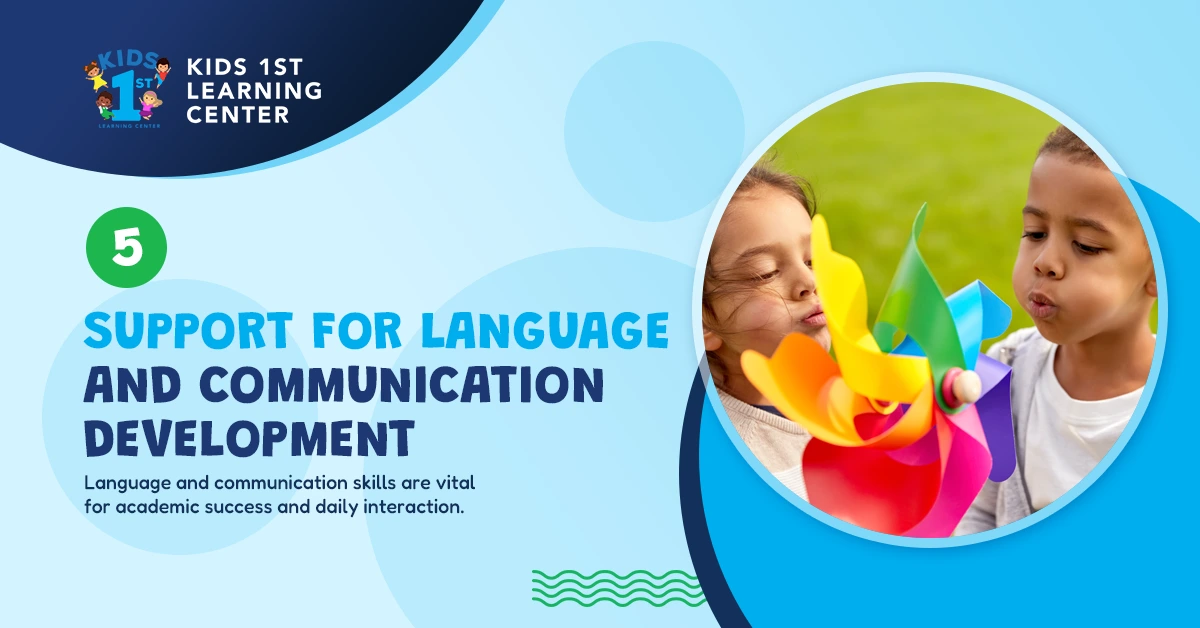
Language and communication skills are vital for academic success and daily interaction. Early childhood education programs provide targeted support for developing these abilities through structured lessons, peer interaction, and educator guidance. A language-rich environment helps children build vocabulary, improve listening skills, and express themselves clearly and confidently.
Vocabulary and Listening Skills
Consistent exposure to spoken language, storytelling, and songs enhances a child’s ability to comprehend and use language effectively.
Key areas of growth include:
- Expanded vocabulary: Children learn new words through books, songs, and daily conversations
- Improved comprehension: Listening to instructions and stories strengthens understanding and attention span
- Auditory processing: Activities that involve following directions and sequencing support listening accuracy
These experiences help prepare children for reading and structured classroom communication.
Verbal Expression and Social Communication
Early learning settings encourage children to speak, ask questions, and share ideas in group and individual contexts.
Communication development includes:
- Expressing thoughts clearly: Children practice describing their needs, feelings, and observations
- Conversational turn-taking: Educators model and guide respectful dialogue
- Nonverbal cues: Children learn to understand and use facial expressions, gestures, and tone
Through daily communication opportunities, children build the skills needed for success in both academic and social environments.
6. Encouraging Healthy Habits and Routines Early On
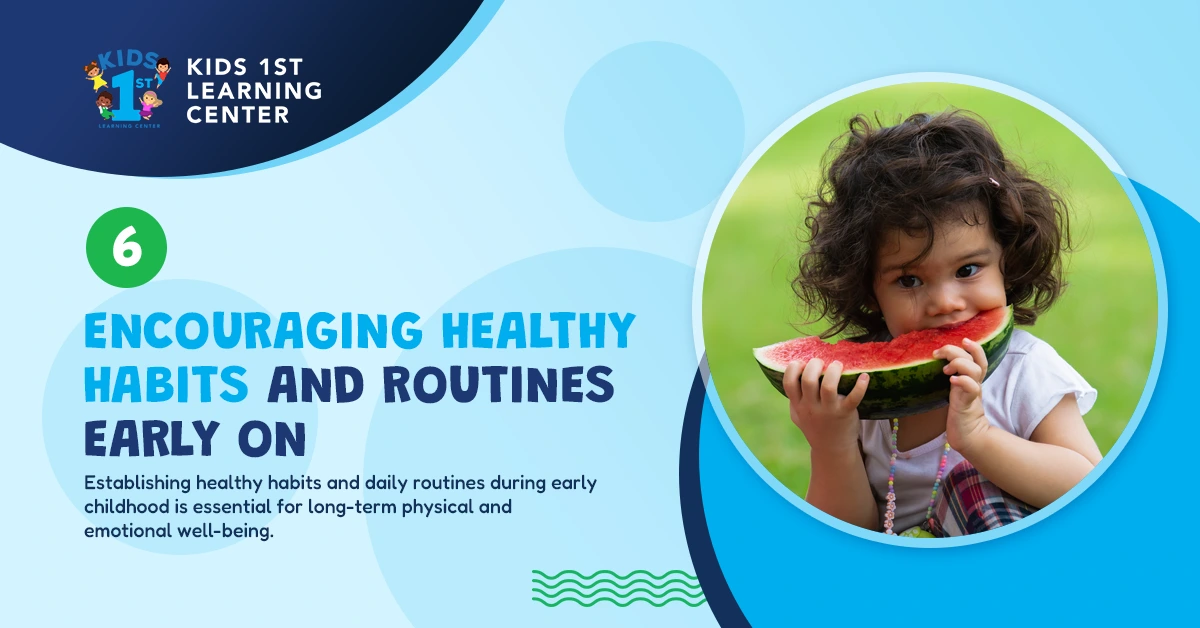
Establishing healthy habits and daily routines during early childhood is essential for long-term physical and emotional well-being. Early childhood education programs integrate structured schedules and guided activities that promote consistency, self-care, and responsible behaviors. These foundational practices support children’s overall development and readiness for elementary school.
Promoting Physical Health and Hygiene
Preschool settings introduce children to essential health and hygiene practices through repetition and modeling.
Common habits include:
- Regular handwashing: Children learn when and how to wash their hands properly throughout the day
- Healthy eating practices: Nutritious snacks and meals help establish positive attitudes toward food
- Physical activity: Daily outdoor play and movement-based learning support gross motor skills and overall fitness
These routines foster lifelong awareness of personal health and physical care.
Developing Consistency and Responsibility
Daily schedules help children feel secure, manage transitions, and build independence.
Key routine elements include:
- Structured meal and nap times: Predictable patterns support physical regulation and emotional stability
- Cleanup responsibilities: Children learn to care for shared spaces and materials
- Arrival and departure routines: Clear procedures help children adjust to separation and reunification
By encouraging responsibility and structure, early education programs instill habits that benefit children beyond preschool.
7. Strengthening the Parent–Educator Partnership
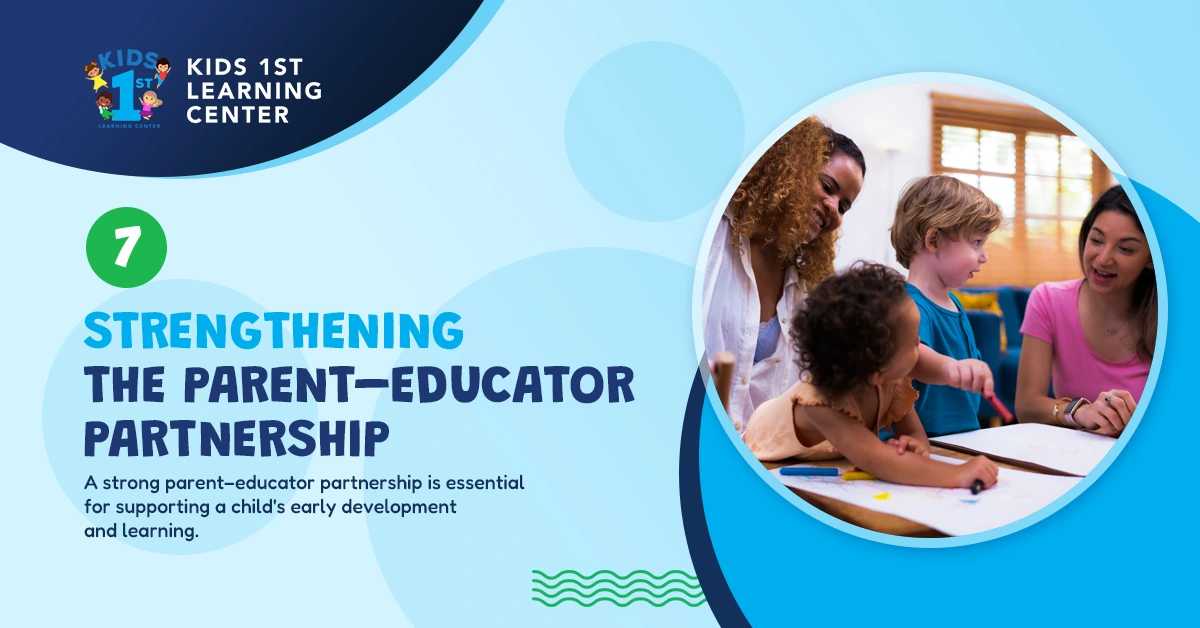
A strong parent–educator partnership is essential for supporting a child’s early development and learning. Early childhood education programs encourage open communication and collaboration between families and teaching staff, ensuring that each child’s needs are understood and addressed consistently. This partnership enhances both academic progress and emotional well-being.
Ongoing Communication and Updates
Frequent updates and open dialogue help parents stay actively involved in their child’s education.
Communication methods often include:
- Daily reports: Teachers share observations about behavior, activities, and milestones
- Parent-teacher conferences: Scheduled meetings allow for in-depth discussions on growth and goals
- Digital tools: Some programs use apps or portals to share photos, updates, and messages in real-time
Regular communication fosters trust and ensures that concerns are addressed promptly.
Collaborative Goal Setting
Working together allows families and educators to align efforts and promote consistent expectations across home and school environments.
Collaborative practices include:
- Individual learning plans: Goals are set based on the child’s strengths and areas for growth
- Family involvement opportunities: Events, workshops, and classroom participation invite parents into the learning process
- Shared strategies: Educators and parents exchange ideas to support behavior, routines, or developmental progress
This cooperative approach reinforces learning and creates a unified support system for each child.
Conclusion
Early childhood education programs offer far-reaching benefits that shape a child’s academic path, social development, and emotional well-being. These programs provide a comprehensive foundation for lifelong success, from building essential skills to preparing for kindergarten and instilling healthy habits. Children thrive in every growth area when families understand the value of early education and engage in strong partnerships with educators.
Discover how a quality early learning experience can support your child’s development. Contact Kids 1st Learning Center today at (818) 873-0133 or visit https://kids1st.org/contact-kids-1st / to learn more about our programs and enrollment options.

